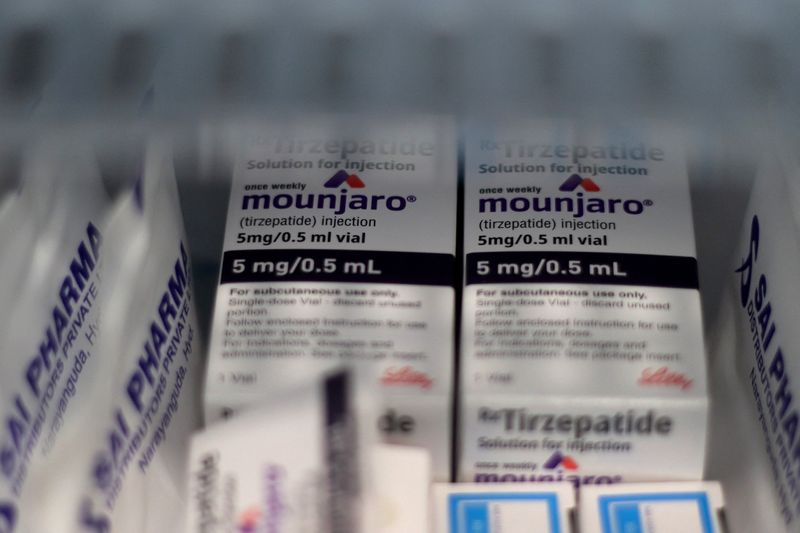Eli Lilly’s strong quarter undercut by CVS move to drop Zepbound coverage

By Bhanvi Satija and Patrick Wingrove
(Reuters) -Eli Lilly on Thursday posted better-than-expected quarterly results, but CVS Health (NYSE:CVS)’s decision to drop the company’s obesity drug Zepbound from the list of medicines it covers for reimbursement dragged shares down over 5%.
CVS said its pharmacy benefit management unit, which is the largest in the U.S., would drop Zepbound coverage from July 1, but keep reimbursing for rival GLP-1 weight-loss drug Wegovy after negotiating a more favorable price from Danish drugmaker Novo Nordisk (NYSE:NVO).
The success of Lilly’s diabetes and weight-loss treatments has led the Indianapolis-based drugmaker to become the world’s most valuable healthcare company, with a market value of more than $800 billion.
"The battle between Novo and Lilly is clearly adding meaningful price pressure" to the GLP-1 medicines, said Bernstein analyst Courtney Breen, adding that patients and doctors have shown preference toward Zepbound.
Lilly said lower prices for Zepbound trimmed revenue in the quarter, but that demand remained strong. Sales of the drug came in at $2.31 billion for the first quarter, compared to analysts’ expectations of $2.33 billion, according to LSEG data.
In February, Lilly cut the price for vials of Zepbound by $50 or more and expanded the range of doses it sold online to address competition from compounding pharmacies and Novo. It now offers the two lowest doses of Zepbound for $349 and $499 for a month’s supply.
3rd party Ad. Not an offer or recommendation by Investing.com. See disclosure here or remove ads.Weekly U.S. prescriptions of Wegovy have plateaued since mid-February, according to IQVIA data provided by analysts, with Zepbound prescriptions overtaking Novo’s obesity drug by more than 127,000 for the week ending April 18.
Lilly said it had captured about 53.3% of the U.S. market share.
"There’s always the risk of a price competition when your competitor Novo Nordisk is frankly not doing enough with its pipeline. So they may try to get a bit too aggressive on pricing just to maintain market share," said Kevin Gade, portfolio manager at Bahl & Gaynor, which owns Lilly shares.
Sales of Lilly’s diabetes drug Mounjaro, which has the same active ingredient as Zepbound, were $3.84 billion, exceeding analysts’ estimates of $3.80 billion.
Lilly cut its full-year adjusted profit forecast to between $20.78 and $22.28 per share, from its previous view of $22.50 to $24.00 per share, citing deal charges.
The drugmaker said its forecast is based on "the existing tariff and trade environment," and did not quantify any impact from potential tariffs.
Lilly, like Novartis (SIX:NOVN) and Johnson & Johnson (NYSE:JNJ), has committed to increasing its U.S. manufacturing presence, pledging to spend at least $27 billion as the threat of tariffs from U.S. President Donald Trump looms over the sector.
On an adjusted basis, Lilly earned $3.34 per share for the quarter, topping analysts’ estimates by 32 cents.
Total revenue for the period was $12.73 billion, above Wall Street expectations of $12.67 billion.
3rd party Ad. Not an offer or recommendation by Investing.com. See disclosure here or remove ads.Is LLY truely undervalued?With LLY making headlines, investors are asking: Is it truly valued fairly? InvestingPro's advanced AI algorithms have analyzed LLY alongside thousands of other stocks to uncover hidden gems with massive upside. And guess what? LLY wasn't at the top of the list.
Unlock ProPicks AI